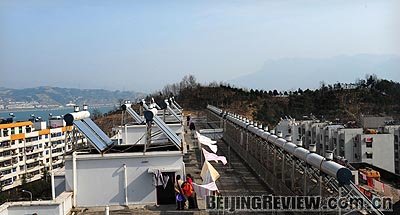| China's draft Energy Law has been submitted to the State Council's Legislative Affairs Office and will be considered at this year's executive meeting, said a key member of the expert panel drafting the law. If the law makes it through the council, the National People's Congress (NPC), China's supreme law-making body, will vote on it.
 |
|
CLEAN ENERGY? Solar water heaters are installed on the roofs of residences in Zigui County, Hubei Province. By the end of 2008, solar water heaters had been installed in half of the households in the county ZHENG JIAYU |
The progress of China's Energy Law has received widespread attention in and out of country. In January 2006, a taskforce was established to draft the legislation. The panel, organized by the Office of the National Energy Leading Group, completed a draft of the law in early October 2007. In December of that year, the National Development and Reform Commission published the draft and solicited public opinion. The revised draft incorporating public feedback is the one recently submitted to the Legislative Affairs Office for preliminary review.
This draft of the law includes 15 chapters and 140 articles. A broad piece of legislation, it addresses energy management and supervision, energy strategy and planning, development and supply, conservation and emissions reductions, climate change, taxation and pricing, reserves and emergency response, science and technology policies and international energy cooperation.
Legislative vacuum
February's national energy working conference stressed the importance of the Energy Law and the need for legal instruments to be built around it. Conference members suggested the law should spell out specifics on coal, oil, natural gas, electricity, renewable energy and conservation.
Although China already has separate laws on different energy sources, the country does not have systematic and comprehensive legislation governing the development, use and management of energy, said Ye Rongsi, the expert panel's vice chief. The new law is expected to fill that vacuum. The panel will also incorporate language that coordinates existing energy guidelines with other laws, guaranteeing the implementation of energy strategy and ensuring national energy security, Ye said.
China is about to make its 12th Five-Year Plan (2011-15) for the energy sector. The plan will outline the national energy development strategy at a macro-level, according to the national energy working conference. Some experts said problems used to plague the plan, and those who did not abide by it were not held legally responsible. They hope the new law will change this situation by creating standard procedures for enforcement.
Legal guarantee
As it stands now, the draft defines a national energy strategy in legal terms, said Xiao Guoxing, a law professor at the East China University of Science and Technology.
The State Council is authorized to make and publish the national energy strategy, which is valid for 20 to 30 years. The strategy is evaluated and amended every five years or whenever necessary.
China has a diverse energy portfolio and its energy industry is scattered geographically. This hampers an economy of scale in the sector and makes the formulation of a national energy security strategy more difficult.
Recently, the government has vigorously pushed for mergers and consolidations between energy enterprises, especially those in coal industry to help the situation. The head of the National Energy Administration, Zhang Guobao, said in February that this year the state will make plans to further encourage the merging of Chinese energy firms, especially coal firms.
State Administration of Work Safety (SAWS) statistics show that in 2007, China's 10 largest coal enterprises produced almost 26 percent of all the coal produced in the country. In the United States, meanwhile, the industry is more concentrated. The output of a single large U.S. private coal company accounted for about 18 percent of that country's total output, according to SAWS.
| 